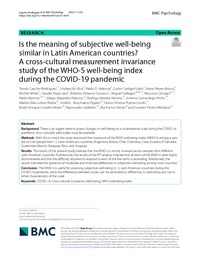Mostrar el registro sencillo de la publicación
Is the meaning of subjective well-being similar in Latin American countries? a cross-cultural measurement invariance study of the WHO-5 well-being index during the COVID-19 pandemic
| dc.contributor.author | Caycho-Rodríguez, Tomás | |
| dc.contributor.author | Vilca, Lindsey W. | |
| dc.contributor.author | Valencia, Pablo D. | |
| dc.contributor.author | Carbajal-León, Carlos | |
| dc.contributor.author | Reyes-Bossio, Mario | |
| dc.contributor.author | White, Michael | |
| dc.contributor.author | Rojas-Jara, Claudio | |
| dc.contributor.author | Polanco-Carrasco, Roberto | |
| dc.contributor.author | Gallegos, Miguel | |
| dc.contributor.author | Cervigni, Mauricio | |
| dc.contributor.author | Martino, Pablo | |
| dc.contributor.author | Palacios, Diego Alejandro | |
| dc.contributor.author | Moreta-Herrera, Rodrigo | |
| dc.contributor.author | Samaniego‑Pinho, Antonio | |
| dc.contributor.author | Lobos-Rivera, Marlon Elías | |
| dc.contributor.author | Buschiazzo Figares, Andrés | |
| dc.contributor.author | Puerta‑Cortés, Diana Ximena | |
| dc.contributor.author | Corrales‑Reyes, Ibraín Enrique | |
| dc.contributor.author | Calderón, Raymundo | |
| dc.contributor.author | Ferrari, Ilka Franco | |
| dc.contributor.author | Flores-Mendoza, Carmen | |
| dc.date.accessioned | 2023-04-25T14:10:32Z | |
| dc.date.available | 2023-04-25T14:10:32Z | |
| dc.date.issued | 2023 | |
| dc.identifier.uri | http://repositorio.ucm.cl/handle/ucm/4705 | |
| dc.description.abstract | Background There is an urgent need to assess changes in well-being on a multinational scale during the COVID-19 pandemic, thus culturally valid scales must be available. Methods With this in mind, this study examined the invariance of the WHO well-being index (WHO-5) among a sam‑ ple of 5183 people from 12 Latin Americans countries (Argentina, Bolivia, Chile, Colombia, Cuba, Ecuador, El Salvador, Guatemala, Mexico, Paraguay, Peru, and Uruguay). Results The results of the present study indicate that the WHO-5 is strictly invariant across samples from diferent Latin American countries. Furthermore, the results of the IRT analysis indicate that all items of the WHO-5 were highly discriminative and that the difculty required to respond to each of the fve items is ascending. Additionally, the results indicated the presence of moderate and small size diferences in subjective well-being among most countries. Conclusion The WHO-5 is useful for assessing subjective well-being in 12 Latin American countries during the COVID-19 pandemic, since the diferences between scores can be attributed to diferences in well-being and not in other characteristics of the scale. | es_CL |
| dc.language.iso | en | es_CL |
| dc.rights | Atribución-NoComercial-SinDerivadas 3.0 Chile | * |
| dc.rights.uri | http://creativecommons.org/licenses/by-nc-nd/3.0/cl/ | * |
| dc.source | BMC Psychology, 11(1), 102 | es_CL |
| dc.subject | COVID-19 | es_CL |
| dc.subject | Cross-cultural | es_CL |
| dc.subject | Invariance | es_CL |
| dc.subject | Well-being | es_CL |
| dc.subject | WHO well-being index | es_CL |
| dc.title | Is the meaning of subjective well-being similar in Latin American countries? a cross-cultural measurement invariance study of the WHO-5 well-being index during the COVID-19 pandemic | es_CL |
| dc.type | Article | es_CL |
| dc.ucm.facultad | Facultad de Ciencias de la Salud | es_CL |
| dc.ucm.indexacion | Scopus | es_CL |
| dc.ucm.indexacion | Isi | es_CL |
| dc.ucm.uri | bmcpsychology.biomedcentral.com/articles/10.1186/s40359-023-01149-8 | es_CL |
| dc.ucm.doi | doi.org/10.1186/s40359-023-01149-8 | es_CL |



